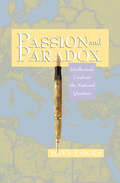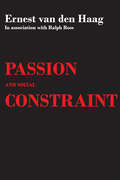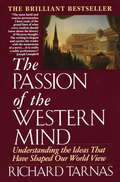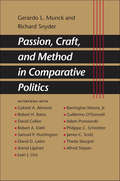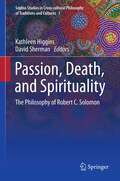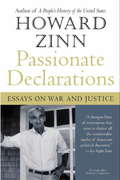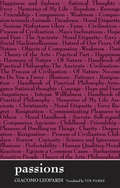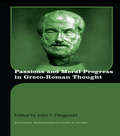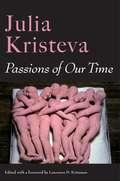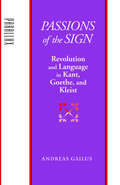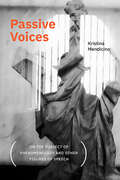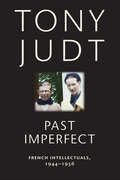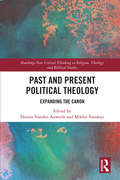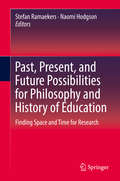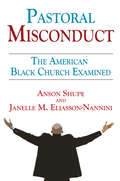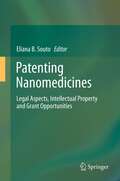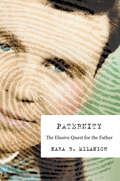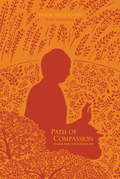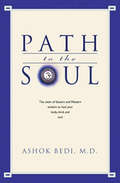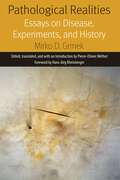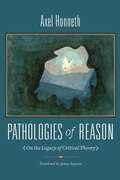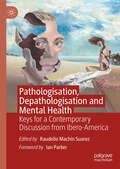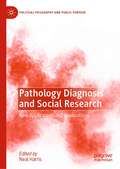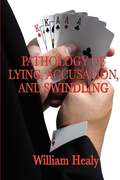- Table View
- List View
Passion and Paradox: Intellectuals Confront the National Question
by Joan CocksFrom Kosovo to Québec, Ireland to East Timor, nationalism has been a recurrent topic of intense debate. It has been condemned as a source of hatred and war, yet embraced for stimulating community feeling and collective freedom. Joan Cocks explores the power, danger, and allure of nationalism by examining its place in the thought of eight politically engaged intellectuals of the nineteenth and twentieth centuries: the antagonist of capital, Karl Marx; the critics of imperialism Rosa Luxemburg, Hannah Arendt, and Frantz Fanon; the liberal pluralist Isaiah Berlin; the neonationalist Tom Nairn, and the post-colonial writers, V. S. Naipaul and Edward Said. Cocks not only sheds new light on the complexities of nationalism but also reveals the tensions that have inspired and troubled intellectuals who have sought to lead lives between detached criticism and political passion. In lively, conversational prose, Cocks assesses their treatment of questions such as the mythology of national identity, the right to national self-determination, and the morality of nationalist violence. While ultimately critical of nationalism, she engages sympathetically even with its defenders. By illuminating the links that distinguished minds have drawn between thought and action on nationalism in politics, this stimulating work provides a rich foundation from which we ourselves might think or act more wisely when confronting a phenomenon that, in fundamental and perplexing ways, has shaped our world.
Passion and Social Constraint
by Ralph RossIn intellectual and academic circles, Ernest van den Haag was respected for his brilliant mind, his outspoken and often highly controversial assertions, and a very unacademic, sharp, biting style.
Passion in Theory: Conceptions of Freud and Lacan (Warwick Studies in European Philosophy)
by Robin FerrellPhilosophy had either ignored or attacked psychoanalysis: such responses are neither warranted nor helpful. One hundred years after its inception, isn't it time to find out what psychoanalysis has to offer us? In Passion in Theory Robyn Ferrell does just that, and returns with some surprising answers. Concentrating on the work of Freud and Lacan, Robyn Ferrell asks why their work had been so influential in European philosophy yet so marginal in the Anglo-American circles. Passion in Theory explores their conception of the relationship between mind and body, and how it provides a key to many current philosophical questions. Passion in Theory is designed for students and researchers in psychoanalysis, traditional and continental philosophy.
Passion of the Western Mind: Understanding the Ideas That Have Shaped Our World View
by Richard Tarnas"[This] magnificent critical survey, with its inherent respect for both the 'Westt's mainstream high culture' and the 'radically changing world' of the 1990s, offers a new breakthrough for lay and scholarly readers alike....Allows readers to grasp the big picture of Western culture for the first time."SAN FRANCISCO CHRONICLE. Here are the great minds of Western civilization and their pivotal ideas, from Plato to Hegel, from Augustine to Nietzsche, from Copernicus to Freud. Richard Tarnas performs the near-miracle of describing profound philosophical concepts simply but without simplifying them. Ten years in the making and already hailed as a classic, THE PASSION OF THE WESTERN MIND is truly a complete liberal education in a single volume.
Passion, Craft, and Method in Comparative Politics
by Richard Snyder Gerardo L. MunckIn the first collection of interviews with the most prominent scholars in comparative politics since World War II, Gerardo L. Munck and Richard Snyder trace key developments in the field during the twentieth century. Organized around a broad set of themes—intellectual formation and training; major works and ideas; the craft and tools of research; colleagues, collaborators, and students; and the past and future of comparative politics—these in-depth interviews offer unique and candid reflections that bring the research process to life and shed light on the human dimension of scholarship. Giving voice to scholars who practice their craft in different ways yet share a passion for knowledge about global politics, Passion, Craft, and Method in Comparative Politics offers a wealth of insights into contemporary debates about the state of knowledge in comparative politics and the future of the field.
Passion, Death, and Spirituality
by David Sherman Kathleen HigginsRobert C. Solomon, who died in 2007, was Professor of Philosophy and Quincy Lee Centennial Professor of Business at the University of Texas, USA. As the first book comprehensively to examine the breadth of Solomon's contribution to philosophy, this volume ranks as a vital addition to the literature. It includes a newly published transcript of Solomon's last talk, which responded to Arindam Chakrabarti on the concept of revenge, as well as the considered views of prominent figures in the numerous subfields in which Solomon worked. The content analyses his perspectives on the philosophy of emotion, virtue, business ethics, and religion, in addition to philosophical history, existentialism, and the many other topics that held this prolific thinker's attention. Solomon memorably defined philosophy itself as 'the thoughtful love of life', and despite the diversity of his output, he was most drawn by central questions about the meaning of life, the essential role that emotions play in finding that meaning, and the human imperative to seek 'emotional integrity', in which one's thoughts, emotions, and actions all contribute to a coherent narrative. The essays included here draw attention to the interconnections between the issues Solomon addressed, and evince the manner in which he embodied that integrity, living a life at one with his philosophy. They emphasize the central themes of passion, ethics, and spirituality, which threaded through his work, and the way these ideas informed his views on how we should approach grief and death. The multiplicity of topics alone make this keystone work an enlightening read for a full spectrum of students of philosophy, providing much to ponder and recounting a subtle and shining example of the emotional integrity Solomon worked so hard to define.
Passionate Declarations: Essays on War and Justice
by Howard ZinnFrom the bestselling author of A People's History of the United States comes this selection of passionate, honest, and piercing essays looking at American political ideology. Howard Zinn brings to Passionate Declarations the same astringent style and provocative point of view that led more than a million people to buy his book A People's History of the United States. He directs his critique here to what he calls "American orthodoxies" -- that set of beliefs guardians of our culture consider sacrosanct: justifications for war, cynicism about human nature and violence, pride in our economic system, certainty of our freedom of speech, romanticization of representative government, confidence in our system of justice. Those orthodoxies, he believes, have a chilling effect on our capacity to think independently and to become active citizens in the long struggle for peace and justice.
Passions
by Tim Parks Giacomo LeopardiRevenge--Revenge is so sweet one often wishes to be insulted so as to be able to take revenge, and I don't mean just by an old enemy, but anyone, or even (especially when in a really bad mood) by a friend.--from Passions The extraordinary quality of Giacomo Leopardi's writing and the innovative nature of his thought were never fully recognized in his lifetime. Zibaldone, his 4,500-page intellectual diary--a vast collection of thoughts on philosophy, civilization, literary criticism, linguistics, humankind and its vanities, and other varied topics--remained unpublished until more than a half-century after his death. But shortly before he died, Leopardi began to organize a small, thematic collection of his writings in an attempt to give structure and system to his philosophical musings. Now freshly translated into English by master translator, novelist, and critic Tim Parks, Leopardi's Passions presents 164 entries reflecting the full breadth of human passion. The volume offers a fascinating introduction to Leopardi's arguments and insights, as well as a glimpse of the concerns of thinkers to come, among them Nietzsche, Dostoyevsky, Wittgenstein, Gadda, and Beckett.
Passions and Moral Progress in Greco-Roman Thought (Routledge Monographs in Classical Studies)
by John T. FitzgeraldThis book contains a collection of 13 essays from leading scholars on the relationship between passionate emotions and moral advancement in Greek and Roman thought. Recognising that emotions played a key role in whether individuals lived happily, ancient philosophers extensively discussed the nature of "the passions", showing how those who managed their emotions properly would lead better, more moral lives. The contributions are preceded by an introdution to the subject by John Fitzgerald. Writers discussed include the Cynics, the Neopythagorians, Aristotle and Ovid; the discussion encompasses philosophy, literature and religion.
Passions of Our Time (European Perspectives: A Series In Social Thought And Cultural Criticism)
by Julia KristevaJulia Kristeva is a true polymath, an intellectual of astonishingly wide range whose erudition and insight have been brought to bear on psychoanalysis, literary criticism, gender and sex, and cultural critique. Passions of Our Time showcases recent essays of Kristeva’s that demonstrate the scope of her capacious intellect, her gifts as a stylist, and the profound contribution of her thought to the challenges of the present.The collection begins with а vivid recollection of celebrating, as a child in Bulgaria, Alphabet Day, the holiday honoring the Cyrillic letters, which proceeds outward into a contemplation of the writer as translator. Kristeva considers literature with Barthes, freedom through Rousseau, Teresa of Avila and mystical experience, Simone de Beauvoir’s dream life, and Antigone and the psychic life of women. A group of essays drawing on her psychoanalytic work delve into Freud, Lacan, maternal eroticism, and the continued importance of psychoanalysis today. In a series of striking investigations, she thinks through disability and normativity, monotheism and secularization, the need to believe and the desire to know. Calling for the courage to renew and reinvent humanism, she outlines the principles of a stance founded on the importance of respecting human life. Finally, Kristeva discusses French culture and diversity, rethinking universalism and interrogating the potential for Islam and psychoanalysis to meet, and pays homage to Beauvoir by rephrasing her dictum into the provocative “One is born woman, but I become one.”
Passions of the Sign: Revolution and Language in Kant, Goethe, and Kleist (Parallax: Re-visions of Culture and Society)
by Andreas GailusPassions of the Sign traces the impact of the French Revolution on Enlightenment thought in Germany as evidenced in the work of three major figures around the turn of the nineteenth century: Immanuel Kant, Johann Wolfgang von Goethe, and Heinrich von Kleist. Andreas Gailus examines a largely overlooked strand in the philosophical and literary reception of the French Revolution, one which finds in the historical occurrence of revolution the expression of a fundamental mechanism of political, conceptual, and aesthetic practice. With a close reading of a critical essay by Kleist, an in-depth discussion of Kant's philosophical writing, and new readings of the novella form as employed by both Goethe and Kleist, Gailus demonstrates how these writers set forth an energetic model of language and subjectivity whose unstable nature reverberates within the very foundations of society. Unfolding in the medium of energetic signs, human activity is shown to be subject to the counter-symbolic force that lies within and beyond it. History is subject to contingency and is understood not as a progressive narrative but as an expanse of revolutionary possibilities; language is subject to the extra-linguistic context of utterance and is conceived primarily not in semantic but in pragmatic terms; and theindividual is subject to impersonal affect and is figured not as the locus of self-determination but as the site of passions that exceed the self and its pleasure principle.At once a historical and a conceptual study, this volume moves between literature and philosophy, and between textual analysis and theoretical speculation, engaging with recent discussions on the status of sovereignty, the significance of performative language in politics and art, and the presence of the impersonal, even inhuman, within the economy of the self.
Passive Voices: On The Subject Of Phenomenology And Other Figures Of Speech) (SUNY series, Intersections: Philosophy and Critical Theory)
by Kristina MendicinoAt least since Aristotle's Peri hermeneias, there has been talk of the pathos of language, of language as "symbols of the affections in the soul." The way these affections are registered, however, suggests that they are themselves structured like language. For Aristotle and others, language is suffered before any sense can be voiced. The pathos of language thus becomes a question of how language affects the subject of speech and, in the last analysis, of how language could respond to these questions of language. Passive Voices (On the Subject of Phenomenology and Other Figures of Speech) approaches these questions, first, through readings of Augustine's investigations into language and mind and Edmund Husserl's descriptions of passive synthesis. It then traces the further resonance of Augustine's and Husserl's interventions in selected literary experiments by Georges Bataille, Franz Kafka, and Maurice Blanchot that recall Husserl and Augustine while exceeding the restrictive fictions of phenomenological "science." In drawing out the echoes that emerge across confessional, philosophical, and fictional writings, this book exposes the ways in which speech occurs in the passive voice and affects any claim to experience.
Past Imperfect: French Intellectuals, 1944-1956
by Tony JudtA &“marvelously readable&” critique of Sartre, Camus, de Beauvoir, and other French postwar intellectuals that &“consistently entertains and provokes&” (The Washington Post). The uniquely prominent role of French intellectuals in European cultural and political life following World War II is the focus of this book by the acclaimed author of Postwar: A History of Europe Since 1945. Tony Judt analyzes this intellectual community&’s most divisive conflicts: how to respond to the promise and the betrayal of Communism and how to sustain a commitment to radical ideals when confronting the hypocrisy in Stalin&’s Soviet Union, in the new Eastern European Communist states, and in France itself. Judt shows why this was an all-consuming moral dilemma to a generation of French men and women, how their responses were conditioned by war and occupation, and how postwar political choices have come to sit uneasily on the conscience of later generations of French intellectuals. Judt&’s analysis extends beyond the writings of fashionable &“existentialist&” personalities such as Jean-Paul Sartre, Albert Camus, and Simone de Beauvoir to include a wide intellectual community of Catholic philosophers, non-aligned journalists, literary critics and poets, Communist and non-Communist alike—and asserts that what he calls the &“moral irresponsibility&” of those years damaged France&’s cultural standing, and reflected the nation&’s larger difficulty in confronting its own ambivalent past. &“A forthright and uncommonly damning study of those intellectually volatile years . . . indicts these intellectuals for their inhumanity in failing to test their political thought against political reality.&” —The New York Times Book Review &“Brilliant . . . splendidly written.&” —Foreign Affairs
Past and Present Political Theology: Expanding the Canon (Routledge New Critical Thinking in Religion, Theology and Biblical Studies)
by Dennis Vanden Auweele Miklos VassányiThis book demonstrates how discussions of Political Theology have been a constant feature throughout philosophical modernity and that they continue to impact contemporary political debates. By tracing the historical roots and detailing the contemporary outworking of Political Theology in Europe, it contends that this growing field requires a broader "canon" in order for it to mature. Political Theology is shown here to be about the diversity of relationships between religious beliefs and political orientations. First engaging with historical debates, chapters re-examine the relationship between personal conviction and societal orientation on such topics as the will to believe, evil, individualism, the relationship between church and state, and the relationship between belief and natural science. The volume then establishes the relevance of these debates for the present day. As such, it invites engagement on the back and forth between religion and politics in a liberal democracy and a communist state, on how communitarianism relates to religious language, on the diversity of Christian and Jewish political theology, and the politics of toleration. By broadening out the field of Political Theology this book offers the reader a more nuanced understanding of its sustained influence on public life. As such it will be of interest to academics working in Political Theology, but also Theology, Philosophy and Political Science more generally.
Past, Present, and Future Possibilities for Philosophy and History of Education: Finding Space And Time For Research
by Naomi Hodgson Stefan RamaekersOn the occasion of the retirement of Paul Smeyers, this book considers the state and status of the philosophy and history of education today. Over the last 20 years, the conditions in which research takes place have changed considerably. They have done so in ways that are often less than favourable to disciplines such as history and philosophy of education, and the space and time for the practices that constitute these disciplines – of reading, of writing, of collegiality – is increasingly under pressure. During this time, the Research Community on the History and Philosophy of Educational Research has convened annually to bring its critical lenses to bear on these emergent conditions and to suggest ways that educational research might, or ought to, be done otherwise. As co-founder and co-convenor of the Research Community, this volume explores and recounts Paul Smeyers' development of Wittgensteinian scholarship and its legacy in education, his formative role in the development of philosophy of education as an international field, his many international collaborations, the “useless” educational-philosophical deepening of concepts, and the wider educational-philosophical import of this. This gives rise to consideration of the failure of these fields to halt the changes in the governance and status of the university that threatens them, and those practices that remain and that are emerging in academia that we wish to protect, to pass on to the next generation of researchers in these fields.
Pastoral Misconduct: The American Black Church Examined
by Janelle M. Eliasson-NanniniIn the past, clergy malfeasance was mentioned only in passing by group members or adherents. The subject was invisible and those who studied it were often stigmatized as hostile to religion itself. Today clergy misconduct is acknowledged as a social problem with growing conceptual and theoretical implications. In Pastoral Misconduct, Anson Shupe and Janelle M. Eliasson-Nannini argue that the history and traditions of black pastoral leadership, coupled with the close identity of many black congregants with their pastor, congregation, and racial subculture, creates opportunity structures that facilitate predatory behavior. Familiarity and mutual identity frequently leads victims to drop their normal levels of wariness. Major denominations and minor sects have been studied, but this unique study by Shupe and Eliasson-Nannini pursues nuances of pastoral bad behavior in a new context. This book is not a tabloid treatment of the American black church. In fact, the black church becomes the vehicle for a major new sociological development: a theory of clergy misconduct in any minority religion.
Patenting Nanomedicines
by Eliana B. Souto"Patenting Nanomedicines: Legal Aspects, Intellectual Property and Grant Opportunities" focusses on the fundamental aspects of Patenting Nanomedicines applied in different "Drug Delivery and Targeting Systems". The promoters of new findings in this field of research are numerous and spread worldwide; therefore, managing intellectual property portfolios, and the acquisition and exploitation of new knowledge face several contingency factors. Today, the scientific community is discussing issues of economic outcomes in the field of Nanomedicines. Major concerns include questions as to whether the research groups, academics, industry and other stakeholders should work in unison or independently, if innovation or adaptation of new technology should be prioritized, public versus private research funding, and safeguarding versus sharing knowledge. However, despite its increasing importance for humankind, it is a matter of concern as to whether technological development can really be stimulated by patent protection. An intellectual property strategy should aim to develop a qualitative patent portfolio for continuous learning. This book addresses questions of ethics, socio-political policies and regulatory aspects of novel Nanomedicine-based products which are currently under development for the diagnosis and treatment of different types of diseases. It is divided in two parts - Part I is composed of the first 3 chapters, which focus on the "fundamentals" of legal aspects, emerging threats, advantages and disadvantages of patenting Nanomedicines, whereas Part II collects 12 chapters discussing different types of Nanomedicine-based products, their potential marketing aspects and patent protection. Whenever applied, each chapter offers a list of patents, based on a specific application in drug delivery and targeting. An outstanding team of 53 authors have contributed to this book, which will be of interest to professionals from the field of patent examiners, academics, researchers and scientists, students and other practitioners.
Paternity: The Elusive Quest for the Father
by Nara B. MilanichFor most of human history, paternity was uncertain. Blood types, fingerprinting, and, recently, DNA analysis promised to solve the riddle of paternity. But even genetic certainty did not end the quest for the father. Rather, as Nara Milanich reveals, it confirms the social, cultural, and political nature of the age-old question: Who’s your father?
Path of Compassion
by Thich Nhat HanhPath of Compassion is a collection of key stories from Thich Nhat Hanh’s classic Old Path White Clouds, a book celebrating its 20th publishing anniversary this year. It tells the fascinating life story of Prince Siddhartha, who left his family and renounced his carefully guarded life, and after many years of spiritual seeking became the Buddha, the Enlightened One. Far more than the description of an unusual life story, it serves as an enjoyable, compelling, and informative introduction to Buddhism by conveying its most important teachings in a compact and accessible format.Thich Nhat Hanh’s ability to show the Buddha as a person who deals with the same life issues as we do is unique and unsurpassed. Written in language accessible to readers of all ages and levels of experience Thich Nhat Hanh combines the description of the major life stages of the Buddha with his most important teachings. Reaching far beyond the biography genre Path of Compassion is a highly readable and informative introduction to Buddhism.
Path to the Soul: The Union Of Eastern And Western Wisdom To Heal Your Body, Mind And Soul
by Ashok BediA Jungian psychoanalyst &“offers a Hindu spin on therapy, challenging readers to rethink childhood conflict and marital strife in terms of karma and dharma&” (Publishers Weekly). Path to the Soul provides an important evolutionary leap in the rapidly evolving understanding of our psychological and spiritual essence. Drawing from Hindu and Christian spiritual wisdom, biological medicine, psychiatric technique, and over twenty-five years of clinical experience, Dr. Bedi has created a highly effective and integrated treatment approach to problems associated with both medical and psychiatric illness. He explains the Hindu concepts of maya, karma, and dharma, and builds a bridge between psychological disease and our intrinsic hunger for spiritual union. Each symptom is seen as a crucial whisper from our soul, and if we understand its message, it can lead us to psychological balance. Dr. Bedi guides us through the process of Kundalini diagnosis, showing how the use of life events, medical or psychiatric symptoms, relationship strengths and problems, and life goals and aspirations can help us determine our dominant and auxiliary chakras. Since our chakras are focal points where physical, emotional, developmental, and spiritual forces intersect, they provide a paradigm that usefully links physical, psychological, developmental, and spiritual dimensions. He explains how he has successfully helped many patients correct imbalances by learning to access and strengthen this energy. Throughout this book there are numerous examples of how Dr. Bedi&’s patients have discovered what each individual eventually has to recognize; that our fulfillment, satisfaction, wholeness, and harmony can be reawakened when we touch the spark of divine light glowing within.
Pathological Realities: Essays on Disease, Experiments, and History (Forms of Living)
by Mirko GrmekMirko D. Grmek (1924-2000) is one of the most significant figures in the history of medicine, and has long been considered a pioneer of the field. The singular trajectory that took Grmek from Yugoslavia to the academic culture of post-war France placed him at the crossroads of different intellectual trends and made him an influential figure during the second half of the twentieth century. Yet, scholars have rarely attempted to articulate his distinctive vision of the history of science and medicine with all its tensions, contradictions, and ambiguities. This volume brings together and publishes for the first time in English a range of Grmek’s writings, providing a portrait of his entire career as a historian of science and an engaged intellectual figure. Pathological Realities pieces together Grmek’s scholarship that reveals the interconnections of diseases, societies, and medical theories.Straddling the sciences and the humanities, Grmek crafted significant new concepts and methods to engage with contemporary social problems such as wars, genocides and pandemics. Uniting some major strands of his published work that are still dispersed or simply unknown, this volume covers the deep epistemological changes in historical conceptions of disease as well as major advances within the life sciences and their historiography. Opening with a classic essay – “Preliminaries for a Historical Study of Diseases,” this volume introduces Grmek’s notions of “pathocenosis” and “emerging infections,” illustrating them with historical and contemporary cases. Pathological Realities also showcases Grmek’s pioneering approach to the history of science and medicine using laboratory notebooks as well as his original work on biological thought and the role of ideologies and myths in the history of science. The essays assembled here reveal Grmek’s significant influence and continued relevance for current research in the history of medicine and biology, medical humanities, science studies, and the philosophy of science.
Pathologies of Reason: On the Legacy of Critical Theory (New Directions in Critical Theory #23)
by Axel HonnethAxel Honneth has been instrumental in advancing the work of the Frankfurt School of critical theorists, rebuilding their effort to combine radical social and political analysis with rigorous philosophical inquiry. These eleven essays reclaim the relevant themes of the Frankfurt School, which counted Theodor W. Adorno, Max Horkheimer, Walter Benjamin, Jürgen Habermas, Franz Neumann, and Albrecht Wellmer as members. They also engage with Kant, Freud, Alexander Mitscherlich, and Michael Walzer, whose work on morality, history, democracy, and individuality intersects with the Frankfurt School's core concerns.Collected here for the first time in English, Honneth's essays pursue the unifying themes and theses that support the methodologies and thematics of critical social theory, and they address the possibilities of continuing this tradition through radically changed theoretical and social conditions. According to Honneth, there is a unity that underlies critical theory's multiple approaches: the way in which reason is both distorted and furthered in contemporary capitalist society. And while much is dead in the social and psychological doctrines of critical social theory, its central inquiries remain vitally relevant. Is social progress still possible after the horrors of the twentieth century? Does capitalism deform reason and, if so, in what respects? Can we justify the relationship between law and violence in secular terms, or is it inextricably bound to divine justice? How can we be free when we're subject to socialization in a highly complex and in many respects unfree society? For Honneth, suffering and moral struggle are departure points for a new "reconstructive" form of social criticism, one that is based solidly in the empirically grounded, interdisciplinary approach of the Frankfurt School.
Pathologisation, Depathologisation and Mental Health: Keys for a Contemporary Discussion from Ibero-America
by Raudelio Machin SuarezThis book examines the pathologisation and depathologisation of mental health in Ibero-América. It highlights the possibilities and the epistemic limits of the interpretative models of pathos that have legitimised mental health pathologies. Further, it proposes a rereading of psychopathology and analyses the clinical, philosophical, ontological, ethical, psychological and anthropological consequences of this. Across ten chapters it brings together academics from Latin America with colleagues from Europe, Asia and North America to address issues including stigma, aesthetics, childhood, gender, migration, political public or social networks and their relationship with mental health. Section 1 brings critical psychology into dialogue with psychiatry, sociology, philosophy and psychoanalysis to review the conceptual frameworks through which "pathology" has been understood in "psy" discourses. Section 2 presents a range of case studies that demonstrate the impact of debates around the pathologisation and de-pathologisation on mental health care in various populations across Latin American. It will offer fresh insights to practitioners, as well as to students and scholars working in the areas of mental health, critical psychology, medical sociology, Latin American studies, psychiatry and psychoanalysis.
Pathology Diagnosis and Social Research: New Applications and Explorations (Political Philosophy and Public Purpose)
by Neal HarrisThe diagnosis of social pathologies has long been a central concern for social researchers working within, and on the peripheries of, Critical Theory. As this volume will elaborate, the pathology diagnosing imagination enables a “thicker” form of social critique, fostering research that pushes beyond the parameters of liberal social and political thought. Faced with impending climatic catastrophe, the accelerating inequities of neoliberalism, the ascent of authoritarian movements globally, and one-dimensional computational modes of thought, a viable form of normative social critique is now more important than ever. The central aim of this volume is thus to champion the pathology diagnosing imagination as a vehicle for conducting such timely social criticism.
Pathology of Lying, Accusation, and Swindling
by William HealyVery little advancement in the treatment of delinquents or criminals can be expected if typical characteristics and their bearings on behavior are not understood. The whole study of characterology or the motivation of conduct is extremely new, particularly in their forensic and psychological significance. It is these characteristics that are addressed here. In some cases, it is vital for the administration of justice for us to understand the types of personality and behaviors before rendering a final judgment. Some appreciation of this fact may be gained from this book which shows the possibility of tracing one form of behavior to its source.
